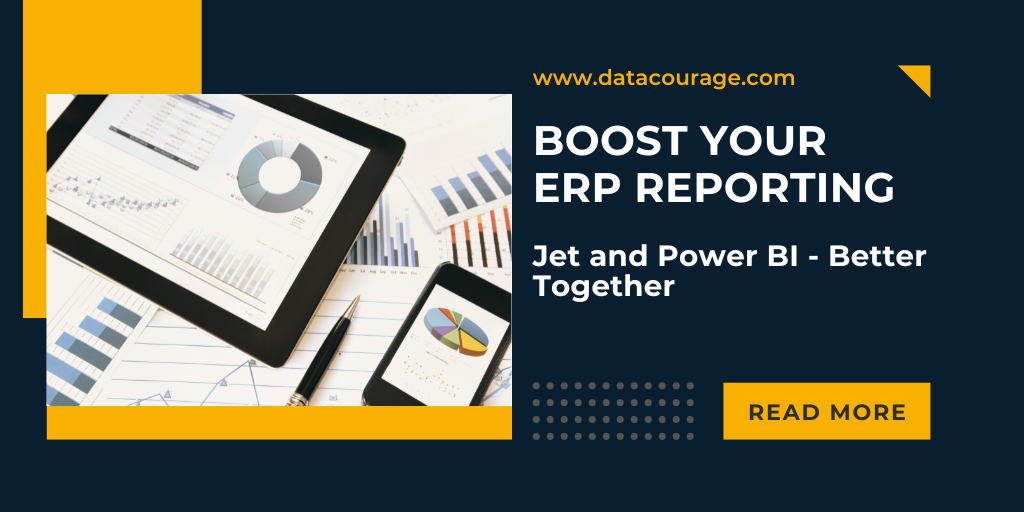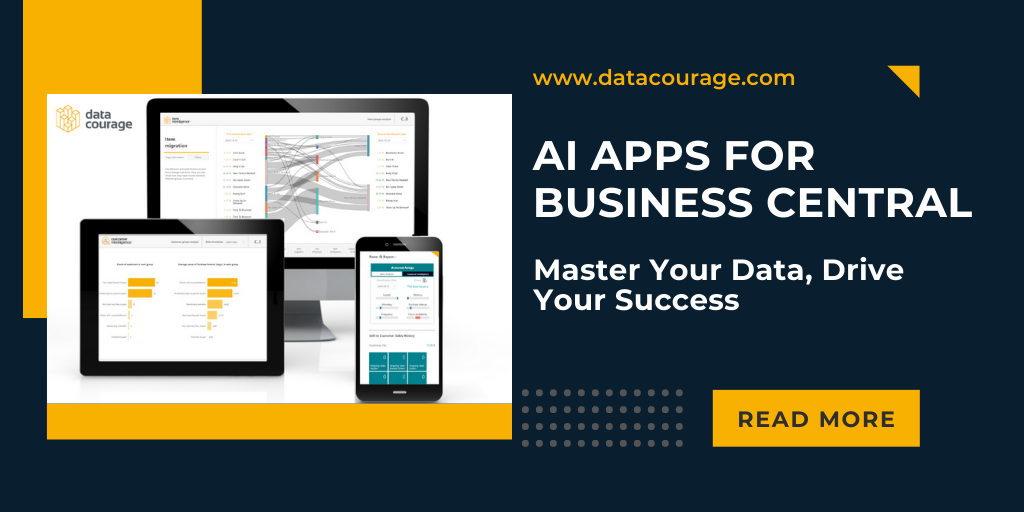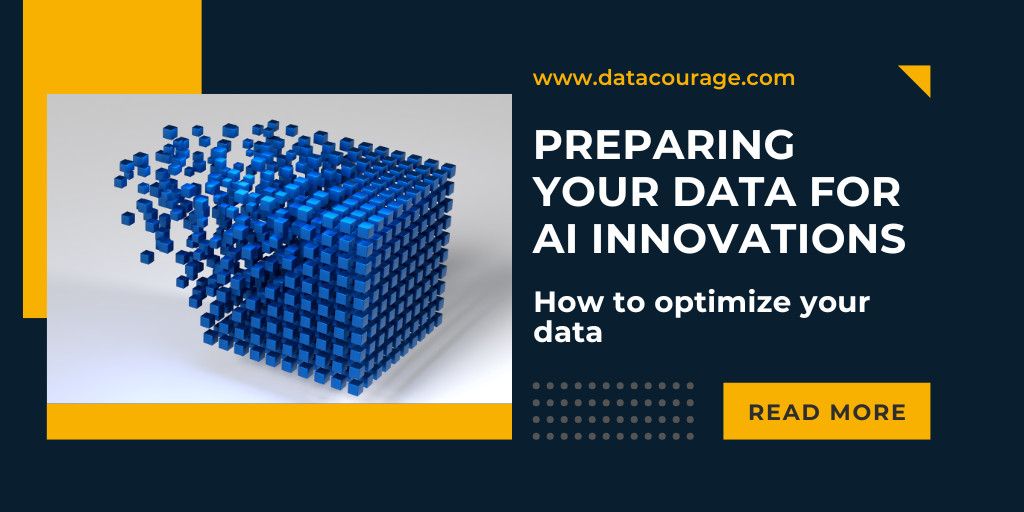Jet and Power BI - Better Together
Navigating the options for reporting and analytics tools can be challenging for Microsoft Dynamics 365 Business Central or Dynamics NAV users....

Did you know that by 2025, global data creation is projected to grow to over 180 zettabytes? To put that in perspective, one zettabyte is equivalent to one trillion gigabytes. In 2021 it was 79, and in 2023 – 120.
This staggering figure highlights the sheer volume of data available and underscores the critical importance of harnessing it effectively. As organizations navigate this data-rich landscape, advanced analytics platforms like Microsoft Fabric, coupled with Azure AI capabilities, become indispensable tools for achieving sustained AI success. In this blog post, we will delve into the benefits of Microsoft Fabric in analytics, explore Azure AI capabilities, and illustrate how Data Courage addresses the challenges with implementation and migration to Microsoft Fabric for a transformative data strategy.
Microsoft Fabric represents a pinnacle of innovation in cloud computing and analytics platforms. It is designed to seamlessly integrate with Azure's cloud services, offering robust data management, analytics, and AI capabilities. This integration empowers organizations to process and analyze data at scale, turning raw data into actionable insights efficiently.
Microsoft Fabric has reached general availability, offering a revolutionary platform that enables the creation of data lakehouses, data warehouses, dashboards, and data science solutions all in one place. This comprehensive integration is designed to streamline and enhance the data management process, providing businesses with the tools they need to derive actionable insights from their data.
As businesses generate and collect more data, the need for sophisticated tools to manage and leverage this data becomes paramount. Microsoft Fabric offers a comprehensive solution by providing advanced analytics tools that can handle complex data workflows and large-scale data operations. This platform is not just about handling data; it's about making data work predictably and beneficially for your business.
Azure AI is a suite of services and tools designed to support developers and data scientists in building AI solutions that are not only innovative but also scalable and secure. From Azure Machine Learning to Azure Cognitive Services, these tools allow for a wide range of AI implementations, from machine learning models to knowledge mining.
The integration of Azure AI with Microsoft Fabric enhances its capabilities, enabling automated machine learning, AI model management, and a more streamlined deployment of AI solutions. This combination ensures that enterprises can not only build but also deploy and manage AI applications more effectively.
While Microsoft Fabric is a powerful tool that simplifies data management and analytics, there are still some challenges to address. Despite its general availability, Fabric lacks certain features that are crucial for some users, such as incremental loading and seamless integration with on-premises databases like Dynamics NAV.
Building an effective data lakehouse using Microsoft Fabric requires meticulous planning and design. This involves not just the technical architecture but also strategies for data integration, transformation, and management. Here are some critical considerations:
One specific challenge when using Microsoft Fabric is dealing with the metadata (options) in Dynamics NAV. Metadata in Dynamics NAV is often encoded within the database, making it difficult to extract and integrate with other systems. Here are the key challenges and potential solutions:
At Data Courage, we specialize in helping businesses implement and migrate to Microsoft Fabric. Our expertise ensures that the transition is smooth, and your team is up and running with the new system without disrupting your current operations.
Our team provides end-to-end support during the implementation and migration phases, ensuring that your data is migrated securely and your team is trained to leverage the full capabilities of Microsoft Fabric. This includes:
Post-implementation, Data Courage offers ongoing support and optimization services to ensure that Microsoft Fabric continues to meet your business needs effectively as they evolve. Our ongoing support includes:
Microsoft Fabric excels in comprehensive data management, offering seamless data ingestion, storage, processing, and analysis within a unified platform. This integration simplifies operations and enhances efficiency, ensuring all data, whether structured or unstructured, is accessible and usable.
Equipped with advanced analytics tools, Microsoft Fabric turns raw data into actionable insights. It supports real-time analytics, enabling quick decision-making, and integrates machine learning and AI tools for predictive modeling. Additionally, robust data visualization tools help stakeholders understand and act on data insights.
Microsoft Fabric scales effortlessly to accommodate growing data volumes without sacrificing performance. Distributed computing and high-performance storage ensure efficient data processing and quick access, supporting extensive analytics and reporting needs.
Designed for seamless integration, Microsoft Fabric works well with other Microsoft services and third-party tools. It integrates deeply with Azure services and provides APIs and connectors for smooth data flow between different business applications.
Security and compliance are core to Microsoft Fabric. It offers data encryption, granular access controls, and compliance with industry standards like GDPR and HIPAA, ensuring data protection and regulatory adherence.
Microsoft Fabric is cost-efficient, offering pay-as-you-go pricing and resource optimization to minimize costs while maximizing performance. This model ensures businesses can manage their data effectively without incurring unnecessary expenses.
If you're looking to build a robust data lakehouse or data warehouse solution, contact Data Courage. Our expertise in Microsoft Fabric ensures that we can help you overcome any challenges and fully realize the benefits of this powerful platform. Let us assist you in creating a data infrastructure that supports your business goals and drives sustained AI success.

Navigating the options for reporting and analytics tools can be challenging for Microsoft Dynamics 365 Business Central or Dynamics NAV users....

Gaining deep insights into customer behavior and product performance has always been a critical factor for staying ahead of the competition. But the...

With growing interest in AI, business leaders are recognizing a fundamental reality: without broad and diverse datasets, AI cannot reliably identify...